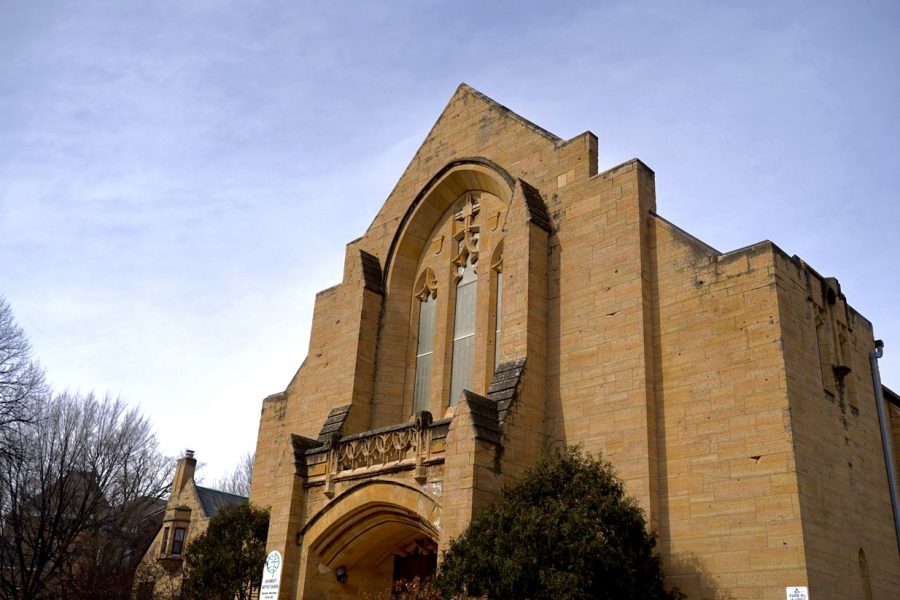This past summer, when a homeless encampment began growing on the patio of University Lutheran Church of Hope (ULCH) near Dinkytown, neighbors were unsure of how or if they should support the people staying there.
After a long summer of “mostly positive experiences” and needs being met, most of the housed people in the neighborhood had jumped on board with the idea to continue helping the unhoused community. However, after ULCH’s sober high school began the new semester, the church struggled with the decision and ultimately asked the unhoused residents to leave.
“It doesn’t feel good to break up an encampment,” ULCH lead pastor Jen Nagel said. “So then it was a matter of figuring out like, well, what can we do, and not just for us to feel better, but to actually make a difference that has a bigger, long-term impact.”
Now, a group of community members around Dinkytown has been working to continue supporting their unsheltered neighbors in any way they can — just as many of those neighbors have been supporting the community for years.
The Dinkytown unsheltered advocacy group was started by former ULCH minister of faith and community Nick Tangen and has been leading a variety of efforts within the last year, including hygiene and food kit distribution, food insecurity resource promotion and a drop-in day event earlier this month.
“We wanted to make sure that we were doing our best to make these folks feel as welcome here as possible and to make sure that they had a place to be seen and known in Dinkytown,” Tangen said. “If the church can’t be that place, then I don’t know what the hell we’re here for.”
While several of the actions have happened at churches in the area, Nagel stressed that the group’s work is not driven by a religious agenda and is welcome to all without judgment. She said other local organizations — like the Aliveness Project and a variety of other neighborhood associations — are equally important in getting the work done.
University graduate student and Como Cares team founder Cody Hoerning believes it is important to help people who need assistance within the community.
“Too many of us (and I have certainly done it myself) simply pass by those who are struggling without giving it a second thought or lending a helping hand,” Hoerning said in an email to the Minnesota Daily. “This work is also important as a way to destigmatize reaching out for help and talking about personal struggles.”
Advocacy group members and unsheltered people around the area said personal struggles often include things like long-standing mental health issues, problems finding resources and substance abuse.
Chris Zann, a formerly unhoused community member who has lived in the area for about three years, said people will sometimes drink or smoke to push away their worries. Whether they failed to get a job or their mother died, he said alcohol could be a comfort through tough times.
Dinkytown is a “magic street,” Zann said. He said the density of students and businesses, plus the historical legacy — like Bob Dylan’s past in the area — has made it more appealing for unsheltered neighbors to stick around Dinkytown.
Several unhoused people spoke about regularly cleaning up the streets and working to keep the area safe.
“Everyone’s just out here trying to live, man,” said Robert Commodore, a formerly unhoused community member who has been living in a sober house since last April. “It depends on who’s out here day-to-day: who wants to give or who is just trying to take advantage. Everyone can appreciate 20 bucks.”
Several camps often pop up around Dinkytown and unsheltered people have formed a “black and gray market” system of bartering with one another for resources and money. When the wet and cold are some of the biggest threats to their life in the fall and spring, items like socks and spare blankets become extremely valuable commodities.
BeetleJuice, a “free-range” community member who chooses to remain homeless, works as on-site security for ULCH. He said he always makes sure to keep extra essential items for other people he may see on the street.
“I try to provide what I can when I can,” he said. “I know how much it sucks not to have something when you really need it out here.”
Many of them are concerned that more people will experience homelessness after the state’s eviction moratorium is lifted. In the meantime, the advocacy group is still working to get its bearings and become a fixture that neighbors can trust and reach out to. Another drop-in event is on the horizon, and the group is hoping to have more regular things available, like bathroom access.
“I think often in Dinkytown, our unsheltered friends are thought of as problems,” said Tangen, the founder of the advocacy group. “Really, we’re just people helping people or showing ways to have people help themselves. In the end, who can’t get behind that?”















Emilie Quast
Mar 31, 2021 at 3:40 pm
Please get the name right. It is not, and never has been “University Church”. I attended for years, both my kids were confirmed there, ULCH sponsored my son’s Cub Scout Troop, I used to live half a block away. It is not “University Church”.